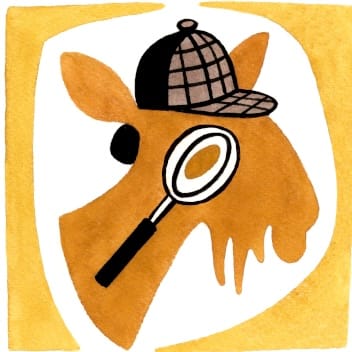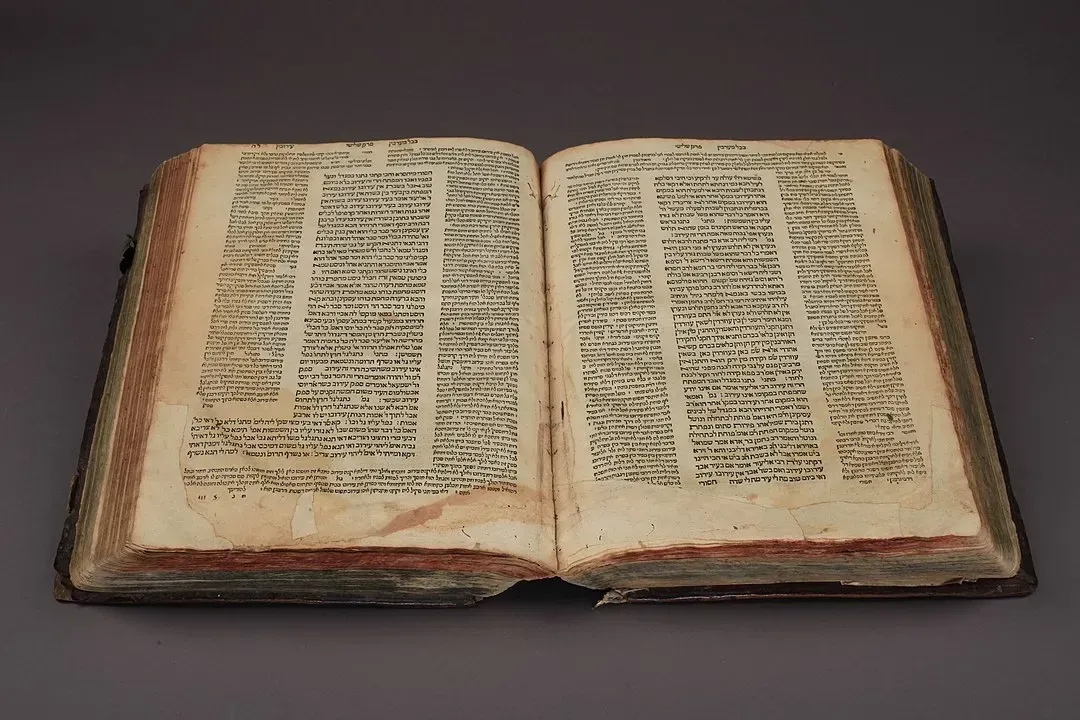What's the Talmud?
Everybody knows that the sacred text of Judaism is a set of 24 books called the TaNaKh, which is an acronym for Torah, Nevi'im, and Ketuvim, with the Torah being the most sacred collection of books and the texts getting decreasingly sacred from there. Together, they mostly overlap with what Christians refer to as "the Old Testament" (except they rearranged it to be in a different order, added some stuff, and ran it through AltaVisa Babelfish Translator ten times). The TaNaKh is roughly 304,901 words long, written out in scrolls. If you wrote that out in size 12 Arial font on A4 paper, you'd get about 677 pages.
But what a lot of non-Jews don't know is that the TaNaKh is not actually the bulk of our liturgy. It's certainly important, especially the Torah, but there's another 5,422+ pages of liturgy that is completely Jewish and has no overlap with any other religion, and which is truly the primary text that has actually shaped what Judiasm is today.
I'm talking about the Talmud. The Talmud is composed of two texts in conversation with each other: the Mishnah, the "oral torah," a collection of centuries Jewish oral traditions written down; and the Gemara, which is centuries of rabbinical commentary upon the Mishnah. Additionally, most talmuds you read will have even more commentary upon the Gemara from the likes of Rashi and Maimonides. There's two versions of the Talmud, the Jerusalem edition and the Babylonian edition, but most people read the Babylonian edition (Talmud Bavli). Jewish liturgical texts never stopped being added though. After the talmud you've got commentaries and responsas and kabbalistic texts on and on endlessly and you can read all of it for free with commentary on sefaria.org
The Talmud is amazing. It's thousands and thousands of pages of bizarre recollections of arguments, myths, gossip, and stories of ancient rabbis saying and doing weird things which somehow illustrate some sort of wisdom. The Talmud is formatted so that it's always attributing things to specific rabbinical sources, so nothing is the absolute truth. It simply says that this is what one rabbi believed, and often will follow it with three other opinions by three different people.
I think the Talmud is just a good time to read and I recommend it to anyone who wants a good time being made to think about strange things that are still relevant today. Also it's very funny. There's rabbis with laser vision on multiple occasions and gay rabbis and details on which rabbis had the biggest dick and descriptions of sexy fat rabbis delivering sick comebacks to fatphobic roman aristocrats and stories on why you shouldn't be a cop and profound stories about community and trauma and philosophical debates on when it's okay to break rules and who decides what the rules are anyway.
How to Read Talmud
There's a lot of different ways to read the Talmud. Some people read one page a day from page 1 and keep doing that for seven to fourteen years. Some people read it in Hebrew and Aramaic and read all the commentaries in the sidebars. A very highly recommended activity is to study talmud with a chevruta (or, "study buddy") and discuss what you're reading together as you read it. Find a jastro (special hebrew/aramaic dictionary) and look up specific words to dig deeper into the meaning of passages that interest you.
For beginners, I recommend reading the Babylonian edition, in English, on Sefaria where you can click on any paragraph to bring up commentaries if you want, but can easily read it through without decoding Rashi's handwriting.
The Talmud is broken into six orders, sixty-three tractates, and 517 perekim. The six orders are Seeds, Festivals, Women, Damages, Holies, and Purities. The tractates are subdivisions within these orders, and the perekim are chapters of the tractates. The Talmud is very stream of consciousness, so these headings don't mean very much. Perekim don't usually have a coherent theme separating them from other perekim. So generally, we refer to passages of the Talmud by just stating the tractate and the page number of the tractate, since the talmud has standardized page numbers across published editions. For whatever reason, both sides of a page are considered the same page with an A side and a B side. So we'll say: Shabbat 12a, Bava Metzia 59b, Pesahim 45a etc.
There's no clear beginning or end to most Talmud passages. If you pick a place to start and just keep reading, it will just keep going, until suddenly it seems to be talking about something else entirely. It's all very "speaking of that, here's something else." So just keep reading until you feel like you're satisfied. Usually, once you cross into the next standardized page (from 59b to 60a etc.) you're entering a new story. (This also makes talmud very digestible!)
Where Should I Start?
Bava Metzia 59b: The Oven of Akhnai
Begins with the last paragraph of 59a. This is the story of Rabbis fighting over an oven, which leads to arguing over how you're even supposed to argue, and then declaring G-d's opinion irrelevant in all matters, G-d accepting defeat, and then it becomes about how communities should resolve conflicts and come to consensus, and about ostracism, and how we should treat converts, and also laser vision. There's a lot going on.
Bava Metzia 84a: The Romance of Rabbi Yochanan and Reish Lakeish
This story begins with a large fat rabbi being made fun of by a roman aristocrat who challenges his ability to be a sexual person. He gives a sick comeback and we affirm that big guys can be sexy too. Then we learn about which rabbi had the thickest cock. Then we learn that Rabbi Yochanan was a beautiful twink and hear a tale of his gay romance with the bandit-turned-rabbi Reish Lakeish and the importance of not digging up people's shameful pasts just to get at them, and the importance of disagreement to healthy discourse and healthy relationships.
Pirkei Avot: Ethics of Our Fathers
This is a Mishnah tractate which basically goes through the lineage of every rabbi who appears in the Mishnah and explains who tutored whom and when, and for each rabbi they give some short snippet of wisdom.
It's very digestible since each piece of wisdom is so short. Jews cite these quotes quite a bit. This is where you get "It's not your responsibility to finish the work of repairing the world, but nor are you free to desist from it" and "Know where you come from, where you are going, and to whom you are accountable."
Ta'Anit 23a.14: Honi and the Carob Tree
If you wanna start at the beginning of Ta'Anit 23a you can read about Honi using a magic circle to basically do a direct action protest to make it rain, but I think the more interesting story begins midway through in 23a verse 14. Honi sees a man planting a carob tree and asks why he would plant a tree whose fruit he won't live to eat, since carob trees take 70 years to fruit. The man says "well, when I came into this world, there were carob trees." And now this might maybe be the entire story but just in case you didn't figure it out yet Honi falls 70 years into the future and gets the point more illustrated and then the story doesn't stop there because then we have to think through all the consequences of suddenly disappearing and appearing 70 years later in the future and all the trauma and shit that comes from that? And if you keep reading into 23b and 24a you can learn about Honi's descendants and all sorts of other stuff.
Yoma 85b: Pikuach Nefesh, To Save a Life
The origins of the concept of pikuach nefesh which is that health and saving lives overrides following rules and laws.
Shabbat 152b: The Unrotting Rabbi
Rabbis debate where the line is between life and death, and we meet a chill dead zombie rabbi whose bones will not rot because he never felt envy.
OK What's Next???
Well, I think it's fun to just pick completely random pages and read from there, and you'll eventually find something interesting, especially with a chevruta. You can also search key words that interest you in Sefaria to explore and find more passages about things that interest you. Maybe you want some rabbinic wisdom on forgiveness? Or constructive criticism? Search "forgiveness" on Sefaria and people have collected specific sheets of related passages, or search "tochecha" for passages on criticism.
I cannot more highly recommend the queer talmud podcast Xai, How Are You?. Xava is an amazing host and great at finding talmud passages on questions like "do animals have souls?". If you get really into it, there's the queer talmud organization Svara.
Have fun studying!!
Also fellow Jews please sound off in the comments your favorite talmud passages

